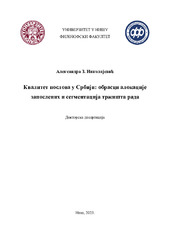Приказ основних података о дисертацији
Kvalitet poslova u Srbiji: obrasci alokacije zaposlenih i segmentacija tržišta rada
| dc.contributor.advisor | Đorić, Gorana | |
| dc.contributor.other | Cvejić, Slobodan | |
| dc.contributor.other | Stojić, Gordana | |
| dc.creator | Nikolajević, Aleksandra Z. | |
| dc.date.accessioned | 2024-03-22T15:34:39Z | |
| dc.date.available | 2024-03-22T15:34:39Z | |
| dc.date.issued | 2023 | |
| dc.identifier.uri | http://eteze.ni.ac.rs/application/showtheses?thesesId=8663 | |
| dc.identifier.uri | https://fedorani.ni.ac.rs/fedora/get/o:2293/bdef:Content/download | |
| dc.identifier.uri | https://plus.cobiss.net/cobiss/sr/sr/bib/135046409 | |
| dc.identifier.uri | https://nardus.mpn.gov.rs/handle/123456789/22359 | |
| dc.description.abstract | In this dissertation, labor market inequalities in Serbia have been analyzed by identifying segments - non-competitive zones of the labor market composed of jobs of different quality to which groups of workers with different characteristics have access with unequal probabilities. Job diversification by quality is situated in the context of neoliberal reforms as a global phenomenon and, more specifically, in the context of changes within the labor market in Serbia after 2000. This dissertation answers four research questions: 1. How can jobs in Serbia be best grouped according to job quality dimensions? 2. How do the identified job profiles differ in quality as well as in the characteristics of labor demand and supply? 3. Which characteristics of employees affect the likelihood of being employed in jobs of different profiles? 4. Is the labor market in Serbia segmented, how many segments are there, and which groups of employees are "condemned" to occupy bad jobs? The questions are answered by analyzing data from the European Working Conditions Survey (EWCS) for 2015 (on a subsample for Serbia). The data were analyzed by cluster analysis (to extract job profiles of different quality), descriptive analyses (to describe job profiles in terms of job quality, as well as the characteristics of labor demand and supply), and multinomial logistic regression (to identify segments in the labor market, i.e., job profiles with distinctive allocation patterns). Four job profiles have been identified based on quality dimensions: Prospective jobs - high quality on all the dimensions; Routine jobs - low quality on wage and skill dimensions; Perspectiveless jobs - low quality on wage and skill dimensions and with limited autonomy in work; and Effortful jobs - low quality on work time, physical and social environment dimensions. Three labor market segments were identified in Serbia, corresponding to Prospective, Effortful, and Perspectiveless jobs. | en |
| dc.format | application/pdf | |
| dc.language | sr | |
| dc.publisher | Универзитет у Нишу, Филозофски факултет | sr |
| dc.rights | openAccess | en |
| dc.rights.uri | https://creativecommons.org/licenses/by-nc/4.0/ | |
| dc.source | Универзитет у Нишу | sr |
| dc.subject | Quality of work, Dimensions of work quality, Job profiles, Allocation patterns, Segment, Labor market segmentation | sr |
| dc.subject | kvalitet poslova, dimenzije kvaliteta poslova, profili poslova, alokacijski obrasci, segment, segmentacija tržišta rada | en |
| dc.title | Kvalitet poslova u Srbiji: obrasci alokacije zaposlenih i segmentacija tržišta rada | sr |
| dc.type | doctoralThesis | |
| dc.rights.license | BY-NC | |
| dc.identifier.fulltext | http://nardus.mpn.gov.rs/bitstream/id/160403/Doctoral_thesis_15249.pdf | |
| dc.identifier.rcub | https://hdl.handle.net/21.15107/rcub_nardus_22359 |


